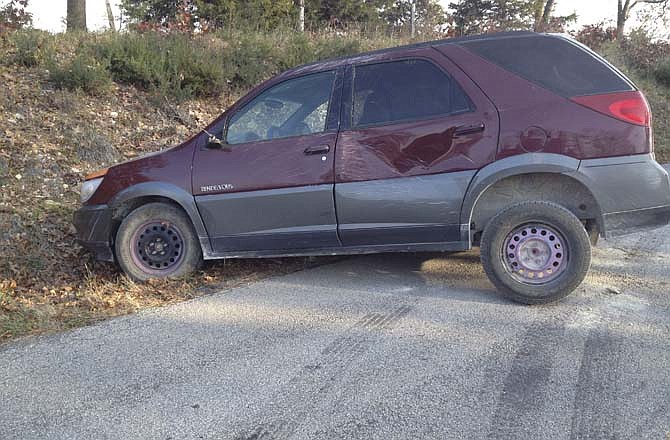Tabitha Clark, 20, of Springfield, sat on the stage in the Capitol Rotunda, listening as others told the story of her collision two years ago - where she was a passenger in her own car when it was hit on the passenger side by a drunk driver.
She hopes one day to talk and walk again - things she can't do because of that collision.
MADD (Mothers Against Drunk Driving) members don't like to use the word accident, since "100 percent are a preventable and violent crime that continues to create victims and kill and/or injure innocent people," National President Colleen Sheely-Church, of Connecticut, reminded about 70 people who gathered Tuesday in the Rotunda for MADD's "Light It Up for Life" Day.
Tabitha's mother, Yvonne Clark, said: "The guy ran a flashing red light at 1:45 in the morning" as Tabitha was coming home from bowling with some friends.
The impact threw the car across a multi-lane street and into a drainage ditch, and Tabitha and her friends had to be cut out of the wreckage with the Jaws for Life.
Tabitha, then 18, suffered a traumatic brain injury so severe doctors at first thought she would die.
"She'll never be 100 percent - we know that," Yvonne said. "She can walk with assistance.
"She just learned to sit up by herself, within the past six months. And she had to learn to feed herself."
Sheely-Church, who's been MADD's national president for the the last four years, told the crowd: "If a sobriety checkpoint was anywhere near that intersection where she was hit, perhaps - just perhaps - she wouldn't be in that wheelchair right now."
And that was the main point of Tuesday's gathering - to urge lawmakers to restore funding so law enforcement officers can use sobriety checkpoints as a way to catch drunk drivers.
The Legislature last year shifted all but $1 of the $20 million in federal funds that had been devoted to impaired driving detection to "saturation patrols."
The decision was described as a technical budgeting maneuver that allowed law enforcement officers to set up sobriety checkpoints if they had other funding sources available.
Criticism among some lawmakers last year centered on concerns about protections against unreasonable search and seizure and due process rights.
With checkpoints, all drivers are stopped, even if they don't appear to be doing anything illegal.
With saturation patrols, extra officers are assigned to pre-defined, but unannounced, areas to watch for signs of drunken driving.
"Here in Missouri, the General Assembly took a huge step backwards in the fight against drunk driving" with last year's budget, Sheely-Church said. "The $1 budget for sobriety checkpoints eliminated a tried-and-true law enforcement activity that catches and deters drunk driving."
While saturation patrols have their place in law enforcement, she noted, a number of studies done in urban, suburban and rural settings showed sobriety checkpoints are more effective.
"(They) found a significant decrease in the number of all crashes," Sheely-Church said. "Crashes, whether fatal or otherwise, dropped an average of 20 percent."
Saturation enforcement cuts crashes by about 17 percent, she reported, while sobriety checkpoints "in the same communities reduced crashes by 28 percent. Checkpoints are significantly more effective."
Sobriety checkpoints, "when conducted properly," delay drivers about 30 seconds, she said - "the time of a red light, a minor inconvenience, as far as I'm concerned, compared to the lives they save."
And the checkpoints have been upheld by the U.S. Supreme Court, so there should be no constitutional issues.
State Rep. Kathie Conway, R-St. Charles, pledged to fight to restore the funding.
Sheely-Church said people who have survived a crash caused by a drunk driver - or the family members who are left after a crash killed a loved one - "have survived the unthinkable."
She lost her son, then 18, when he was a passenger in a car driven by a friend who was "high on marijuana, alcohol and PCP."
The driver lost control, went airborne and over a cliff into a river - and her son drowned while struggling to get out of the back seat.
Leaning against the stage in front of Sheely-Church was a large picture of Graden Duane Lovelace, who was 20 when he was killed on U.S. 50 at the west edge of California, where the two-lane road becomes a four-lane.
He's been traveling from Kansas City to visit his mother and stepfather in New Haven, and then to visit his father and stepmother in Moscow Mills.
His father told Sheely-Church he had taken U.S. 50 instead of Interstate 70 because he thought the drive would be safer.
Meghan Carter, MADD Missouri's executive director, thanked the crowd "for your courage to speak and to share your personal journeys, and to take a stand and to commit to prevent others from living through this same nightmare."
The Associated Press contributed information used in this story.

